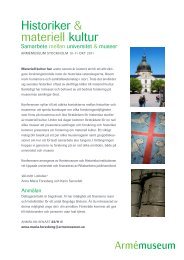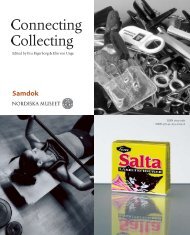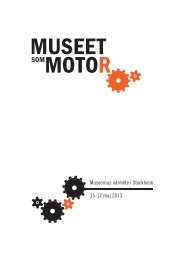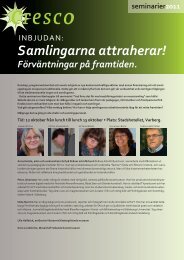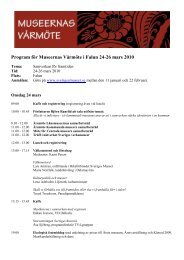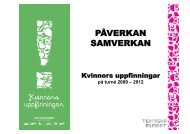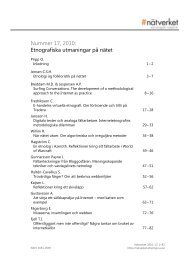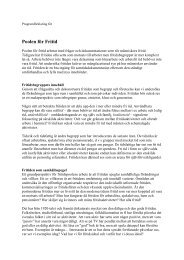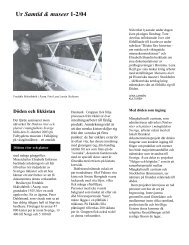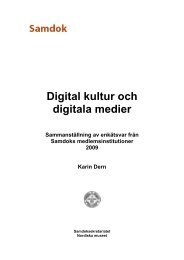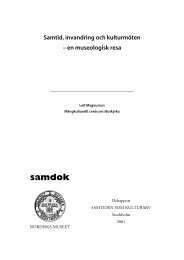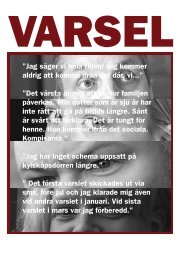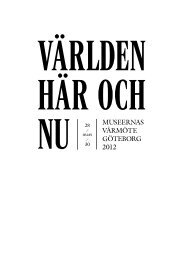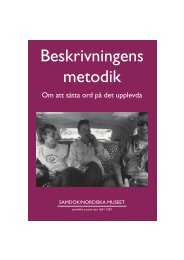Connecting Collecting - Sveriges Museer
Connecting Collecting - Sveriges Museer
Connecting Collecting - Sveriges Museer
Create successful ePaper yourself
Turn your PDF publications into a flip-book with our unique Google optimized e-Paper software.
The Pool for Manufacture and ServicesPeople at workBy Carin Andersson, Ann Kristin Carlström, and Charlotte ÅkermanThe pool for Manufacture andServices focuses on mattersconcerning people involvedin the production of physicalobjects and energy, services,media, and communication.»What our studies have in commonis the focus on people inrelation to conditions in the manufacturingindustry and the service sector.This includes the connection of workinglife to technology and technical development,new forms of organization, decision-makingprocesses and managementstrategies, consequences of changes inownership structures, and the increasedinternationalization.Basic perspectives and methodsThe changes are studied in the presentand against a historical background, sothat material from earlier studies, amongother things, can be used for comparisonin recurrent studies. What happensto occupations and tasks, to the outlookon knowledge and competence, to sociallife and relations between differentsocial and cultural categories at workplaces?What part is played, for instance,by ethnicity, generation, gender, socialgroup, and education?The studies are also intended to shedlight on the way people view their work,what influences them, and how they act.How do demands for “a good job” standup against the companies’ ambitions forrationalization and adjustment to an internationalmarket? What older featureslinger on in industry and the service sector,and how do they affect conditionstoday?Studies in the pool begin when weproblematize certain issues, and we aimat a dialogue with academic research.These issues can be documented togetherwith other actors in society throughcollaboration projects of various kinds.The possibility to cooperate, discuss andexchange experience is of great significancefor developing our knowledge ofmethod and theory.The material from the studies isvaried, consisting of recorded interviewsand written answers to questionnaires,photographs, and artefacts. We strive tocompile the material and make it accessibleto the general public in exhibitionsand publications.At the pool meetings one of the poolmuseums always acts as host institution.At the meetings we discuss how topicalsocial issues and new perspectivescan develop our work at home in themuseums. Lecturers from the researchworld are invited to talk about currentresearch which relates in different waysto matters to do with the pool’s sphereof activity. In the last few years we haveoften discussed questions about conceptssuch as outsourcing, trademarks, globaleconomies, new technology, and mobilemanufacturing. These are new questionslinked to modern industry, and we havefelt that they require a new methodologyand new ways to consider the sector ofsociety that it is our task to document inthe pool.In recent years the pool has held aseries of joint field seminars to give themembers supplementary theoretical andmethodological education and valuableknowledge of and insight into themodern-day industry and service sector.The field seminars comprise lectures,field studies, and discussions about topicsof current interest to the members ofthe pool. A couple of examples are givenbelow.How is Volvo doing?During three days in October 2004 thepool gathered in Eskilstuna to hold aBjörkdal gold mine.Operator Peter Barrljung at Björkdal.Photo Eva Fägerborg©Nordiska Museet.field seminar at the company VolvoConstruction Equipment (VCE). In totalthere were twelve participants from elevendifferent member museums from allover Sweden. The field seminar, whichwas arranged by Eskilstuna City Museumand Västmanland County Museum,was divided into a seminar day, a fieldworkday, and a day for summing up andholding a pool meeting.We viewed VCE as a suitable objectfor joint fieldwork since it is a bigcompany where both manufacture andservices are important parts of the operations.In addition, the company wasin the middle of the processes of changethat we had discussed at our meetings.Outsourcing, the increased computerizationand automation, and the growingimportance of branding were a realityhere. We were able to study and analysequestions and perspectives that felt relevantand up to date.The first day of the seminar beganwith a tour of the large factory premises.After being shown round, the groupgathered to listen to two lectures. Thefirst speaker was Jan Ekström, our host16 • Samtid & museer no 2/07



